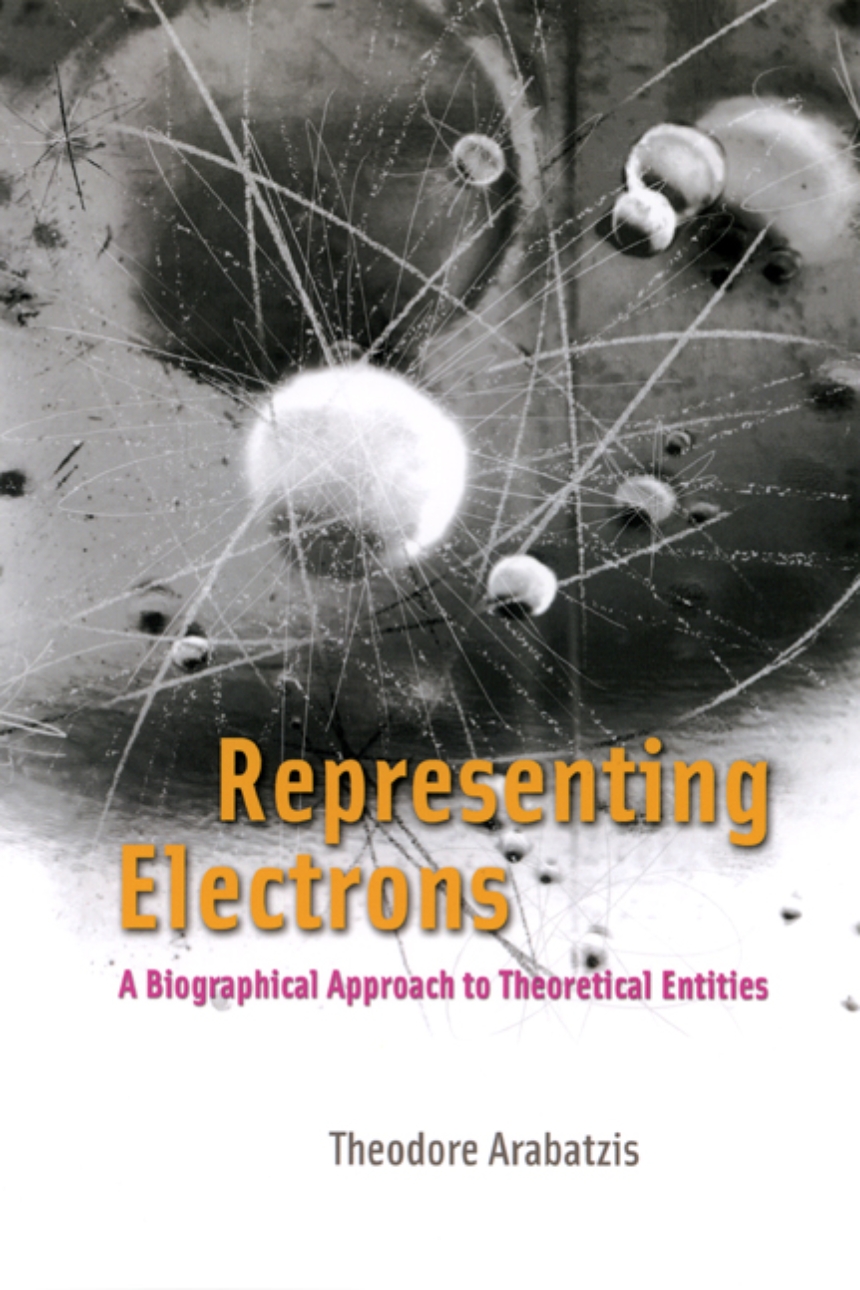Representing Electrons
A Biographical Approach to Theoretical Entities
Both a history and a metahistory, Representing Electrons focuses on the development of various theoretical representations of electrons from the late 1890s to 1925 and the methodological problems associated with writing about unobservable scientific entities.
Using the electron—or rather its representation—as a historical actor, Theodore Arabatzis illustrates the emergence and gradual consolidation of its representation in physics, its career throughout old quantum theory, and its appropriation and reinterpretation by chemists. As Arabatzis develops this novel biographical approach, he portrays scientific representations as partly autonomous agents with lives of their own. Furthermore, he argues that the considerable variance in the representation of the electron does not undermine its stable identity or existence.
Raising philosophical issues of contentious debate in the history and philosophy of science—namely, scientific realism and meaning change—Arabatzis addresses the history of the electron across disciplines, integrating historical narrative with philosophical analysis in a book that will be a touchstone for historians and philosophers of science and scientists alike.
Using the electron—or rather its representation—as a historical actor, Theodore Arabatzis illustrates the emergence and gradual consolidation of its representation in physics, its career throughout old quantum theory, and its appropriation and reinterpretation by chemists. As Arabatzis develops this novel biographical approach, he portrays scientific representations as partly autonomous agents with lives of their own. Furthermore, he argues that the considerable variance in the representation of the electron does not undermine its stable identity or existence.
Raising philosophical issues of contentious debate in the history and philosophy of science—namely, scientific realism and meaning change—Arabatzis addresses the history of the electron across disciplines, integrating historical narrative with philosophical analysis in a book that will be a touchstone for historians and philosophers of science and scientists alike.
296 pages | 6 halftones, 2 line drawings | 6 x 9 | © 2005
Physical Sciences: History and Philosophy of Physical Sciences
Reviews
Table of Contents
Acknowledgments
Introduction
Chapter 1 - Methodological Preliminaries
1. Introduction
2. Karl Popper and the Notion of the “Problem Situation”
3. Scientific Discovery as a Philosophical and Historiographical Category
4. Several Approaches to the Discovery of Unobservable Entities: A Taxonomy and Critique
5. Scientific Realism: The Charybdis of Meaning Change
Chapter 2 - Why Write Biographies of Theoretical Entities?
Chapter 3 - Rethinking “The Discovery of the Electron”
1. What Is Wrong with the Received View?
2. Early-Twentieth-Century Views of the Acceptance of the Electron Hypothesis
Chapter 4 - The Birth and Infancy of the Representation of the Electron
1. Introduction
2. The Birth of the Term “Electron”
3. The Discovery of the Zeeman Effect: The First Experimental Manifestation of the Electron
4. Lorentz’s “Ion”: A Somewhat Startling Hypothesis
5. Larmor’s “Electron”
6. Thomson’s “Corpuscle”: A “By No Means Impossible Hypothesis”
7. Concluding Remarks
Chapter 5 - The Genesis of the Quantum Electron
1. Preliminary Remarks
2. The Electron Migrates to the Quantum World
3. Concluding Remarks
Chapter 6 - Between Relativity and Correspondence
1. Maturing under the Guidance of the Quantum Technologist
2. Being Disciplined by the “Magic Wand”
3. Concluding Remarks
Chapter 7 - “How the Electrons Spend Their Leisure Time”: The Chemists’ Perspective
1. Introduction
2. The Emergence of the Conflict: G. N. Lewis’s “Loafer” Electron
3. A Recapitulation of the Conflict
4. Irving Langmuir’s Elaboration of Lewis’s Ideas
5. Concluding Remarks
Chapter 8 - Forced to Spin by Uhlenbeck and Goudsmit
1. The Setting
2. Becoming Antisocial in the Land of the Formalism-Philistines
3. A Reactionary Putsch
4. Concluding Remarks
Chapter 9 - Identifying the Electron: Meaning Variance and the Historicity of Scientific Realism
1. Introduction
2. Historicizing Meaning: Kuhn’s and Feyerabend’s Antirealist Theses
3. Putnam’s Theory of Meaning and Reference: A Realist Way Out?
4. Hacking’s Entity Realism
5. A Historicist Approach to Meaning and Reference
6. On the Electron’s Identity: What Would We Need in Order to Claim the Electron Exists?
References
Index
Introduction
Chapter 1 - Methodological Preliminaries
1. Introduction
2. Karl Popper and the Notion of the “Problem Situation”
3. Scientific Discovery as a Philosophical and Historiographical Category
4. Several Approaches to the Discovery of Unobservable Entities: A Taxonomy and Critique
5. Scientific Realism: The Charybdis of Meaning Change
Chapter 2 - Why Write Biographies of Theoretical Entities?
Chapter 3 - Rethinking “The Discovery of the Electron”
1. What Is Wrong with the Received View?
2. Early-Twentieth-Century Views of the Acceptance of the Electron Hypothesis
Chapter 4 - The Birth and Infancy of the Representation of the Electron
1. Introduction
2. The Birth of the Term “Electron”
3. The Discovery of the Zeeman Effect: The First Experimental Manifestation of the Electron
4. Lorentz’s “Ion”: A Somewhat Startling Hypothesis
5. Larmor’s “Electron”
6. Thomson’s “Corpuscle”: A “By No Means Impossible Hypothesis”
7. Concluding Remarks
Chapter 5 - The Genesis of the Quantum Electron
1. Preliminary Remarks
2. The Electron Migrates to the Quantum World
3. Concluding Remarks
Chapter 6 - Between Relativity and Correspondence
1. Maturing under the Guidance of the Quantum Technologist
2. Being Disciplined by the “Magic Wand”
3. Concluding Remarks
Chapter 7 - “How the Electrons Spend Their Leisure Time”: The Chemists’ Perspective
1. Introduction
2. The Emergence of the Conflict: G. N. Lewis’s “Loafer” Electron
3. A Recapitulation of the Conflict
4. Irving Langmuir’s Elaboration of Lewis’s Ideas
5. Concluding Remarks
Chapter 8 - Forced to Spin by Uhlenbeck and Goudsmit
1. The Setting
2. Becoming Antisocial in the Land of the Formalism-Philistines
3. A Reactionary Putsch
4. Concluding Remarks
Chapter 9 - Identifying the Electron: Meaning Variance and the Historicity of Scientific Realism
1. Introduction
2. Historicizing Meaning: Kuhn’s and Feyerabend’s Antirealist Theses
3. Putnam’s Theory of Meaning and Reference: A Realist Way Out?
4. Hacking’s Entity Realism
5. A Historicist Approach to Meaning and Reference
6. On the Electron’s Identity: What Would We Need in Order to Claim the Electron Exists?
References
Index
